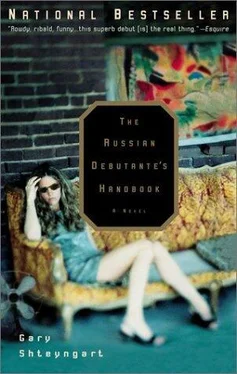Gary Shteyngart - The Russian Debutante's Handbook
Здесь есть возможность читать онлайн «Gary Shteyngart - The Russian Debutante's Handbook» весь текст электронной книги совершенно бесплатно (целиком полную версию без сокращений). В некоторых случаях можно слушать аудио, скачать через торрент в формате fb2 и присутствует краткое содержание. Город: New York, Год выпуска: 2003, ISBN: 2003, Издательство: Riverhead Books, Жанр: Современная проза, Юмористическая проза, на английском языке. Описание произведения, (предисловие) а так же отзывы посетителей доступны на портале библиотеки ЛибКат.
- Название:The Russian Debutante's Handbook
- Автор:
- Издательство:Riverhead Books
- Жанр:
- Год:2003
- Город:New York
- ISBN:0-7865-4177-6
- Рейтинг книги:4 / 5. Голосов: 1
-
Избранное:Добавить в избранное
- Отзывы:
-
Ваша оценка:
- 80
- 1
- 2
- 3
- 4
- 5
The Russian Debutante's Handbook: краткое содержание, описание и аннотация
Предлагаем к чтению аннотацию, описание, краткое содержание или предисловие (зависит от того, что написал сам автор книги «The Russian Debutante's Handbook»). Если вы не нашли необходимую информацию о книге — напишите в комментариях, мы постараемся отыскать её.
and
. The Russian Debutante’s Handbook Bursting with wit, humor, and rare insight,
is both a highly imaginative romp and a serious exploration of what it means to be an immigrant in America.
The Russian Debutante's Handbook — читать онлайн бесплатно полную книгу (весь текст) целиком
Ниже представлен текст книги, разбитый по страницам. Система сохранения места последней прочитанной страницы, позволяет с удобством читать онлайн бесплатно книгу «The Russian Debutante's Handbook», без необходимости каждый раз заново искать на чём Вы остановились. Поставьте закладку, и сможете в любой момент перейти на страницу, на которой закончили чтение.
Интервал:
Закладка:
“Mother!” he shouted to Vladimir’s grandmother, dozing in her wheelchair underneath the giant oaks that delineated the Girshkins’ property from that of their supposedly megalomaniac Indian neighbor. “Remember that hog we had? Tolik?”
Grandma lifted the brim of her floppy straw hat with her good hand. “What did you say?”
“Tolik the Hog,” shouted Vladimir’s father.
Grandma’s eyes widened. “So how come that swine never writes me, that’s what I want to know,” she said, waving a little fist at the doctor and his son. “Boston is close enough, you’d think he’d come down and visit me. I practically raised that bastard after his mother died.”
“No, not Cousin Tolik,” Dr. Girshkin shouted. “I’m talking about Tolik the Hog. Remember, during the war? In the Urals? He got so big we rode him into town. Remember the hog?”
“Oh,” said Grandma. “Oh, yes. I remember a beast. But it wasn’t a hog, it was a cow, and her name was Masha.”
“Masha was after the war!” shouted Dr. Girshkin. He turned to Vladimir. Father and son briefly looked at each other and shrugged, each in his own way.
“Why would we have a hog?” reasoned Grandma, slowly wheeling herself over from her self-designated post, leaving the oaks defenseless before the Indian and his mythical power saw. “We’re Jewish, aren’t we? Sure, your wife eats that pork salami from the Russian store, and I do too sometimes, because that’s what’s in the refrigerator. But an entire hog?”
She settled her bewildered gaze on the tomato patch.
“She’s nearing the sunset, slowly but surely,” said Dr. Girshkin. “Sometimes she thinks there’s two of me. The good Boris and the evil Boris. If I let her guard the oak trees until she falls asleep, and that can be as late as eight or nine o’clock, then I’m the good Boris. The one that’s not married to your mother. If I take her in early, she’ll curse at me like a sailor. And you know that in the autumn it gets damn cold no matter how many jackets I put on her.”
“That’s what awaits us all,” Vladimir said, which was the Girshkin family’s definitive pronouncement on aging and mortality. It was a perfect time to say it, too, for there they were now, assembled in a perfect row—three generations of Girshkins in sad decline: Grandma getting ready to say good-bye to this world, his father already with one toe in the grave, and Vladimir, the third generation, going through all the motions of a living death.
But the first to go would be Grandma, that devoted country baba who had once bought Vladimir his first American cotton windbreaker—the only grown-up to realize that his trendy Hebrew school chums were making fun of his ill-fitting overcoat with its inherent East Bloc smell; the only one to understand the pain in being called a Stinky Russian Bear.
Grandma’s first stroke happened five years ago. For some time she had suspected Tselina Petrovna, her clueless neighbor, of a dastardly plan to denounce her to the Social Security Administration and steal her subsidized apartment. One quiet, snowy night it would happen. The Black Marias would roll up to her building, there would be a knock on the door, and the Social Security Police would drag Grandma away.
Grandma begged Vladimir to translate a letter of denouncement against Tselina, citing her for being a British spy. Or was it an East German spy? A Russian, French, or Finnish spy? Everything was topsy-turvy in this country. “Tell me what kind of spy!” Grandma shouted at Vladimir.
Her grandson tried to humor her, but Grandma wept and accused the family of abandoning her. That same night she had the stroke. After the stroke she had a heart attack and then another stroke.
The doctors were astounded by the resiliency of her body, attributing it to her long life in the countryside. Yet even after she was wheelchair-bound and paralyzed on one side, Grandma could not shake her belief that the Social Security men were due any minute. It happened to her cousin Aaron in Kiev in 1949. A pianist by profession, he had had half his fingers amputated in a frozen Kamchatka labor camp. There were lessons to be learned from that.
Finally, Vladimir’s father moved Grandma out to the suburbs, where she soon found a new enemy in the face of the “murderous, tree-chopping Hindu” of a neighbor, who had once remarked on the size and beauty of the oak trees straddling the property line. And that’s how her heroic vigil in the backyard began.
Vladimir stood behind Grandmother patting her sparse hair. He found a space between two moles atop the warm, wrinkled globe of her forehead and kissed her there, eliciting an astonished look from his father, Grandmother’s official keeper. What’s this? Dr. Girshkin seemed to be saying. Co-conspirators in my own house?
“Of course, there’s no hog, babushka, ” Vladimir spoke softly. “Who raises hogs in Westchester? It’s just not done.”
Grandmother grabbed his hand and bit it affectionately with both of her teeth. “My dear one!” she said. “My only one!” And she was right. They were in this together. Mother and Father may have gone ahead and become rich Americans, but Grandma and Vladimir were still of the same blood, as if a generation had been skipped between them.
After all, she had raised Vladimir, teaching him to write Cyrillic letters when he was four, awarding two grams of cheese for every Slavonic squiggle mastered. She would take him each Sunday to the Piskaryovko mass grave for the defenders of Leningrad—that most instructive of Russia’s field trips—where they would leave fresh daisies for his grandfather Moysei, a slight, thoughtful man shyly holding on to Grandma’s elbow in wedding photos, who perished in a tank battle on the city’s outskirts. And after this simple reckoning in front of a statue of the Motherland, weeping over an eternal flame, Grandma would ceremoniously tie a red handkerchief around Vladimir’s neck. Asthma or not, she promised him, he would join the Red Pioneers someday and then the Komsomol Youth League and then, if he behaved himself well, the Communist Party. “To fight for the cause of Lenin and the Soviet people, are you ready!” she would drill him.
“Always ready!” he would shout back.
But, in the end, the Red Pioneers would have to march on without him…In the end, in the late 1970s, to be exact, the gentle, toothy American Jimmy Carter swapped tons of Midwestern grain for tons of Soviet Jews, and suddenly Vladimir and Grandmother found themselves walking out of the International Arrivals Building at JFK. They took one look at the endless America humming her Gershwin tune before them and cried in each other’s arms.
And this was Grandma today—wheelchair-bound, imprisoned in one of the world’s most expensive backyards, the rustle of stealth station wagons sliding into adjacent driveways, meat burning everywhere, her grandson a grown man with dark circles under his eyes who came to visit his family seasonally, as if they lived in the wilds of Connecticut and not some twenty kilometers beyond the Triborough Bridge.
Yes, Grandma deserved at least one more kiss from Vladimir, but kissing the old woman in front of his father made Vladimir uncomfortable. Grandmother was Dr. Girshkin’s life, his burden and domain, just as Mother was Vladimir’s. Perhaps after the barbecue, if he still felt this tender and bereft, he could smooch her in private.
“People! Opa!” They looked up. Mother was leaning out of her third-floor study, waving a bottle of rum. “He’ll be twenty-six soon. Get out that grill!”
“TODAY I FOUNDa new nickname for your father,” Mother announced. “I’m calling him Stalin.”
“Ha,” Vladimir’s father said, as he stuffed a flaming weenie into a bun for Grandma. “My wife warms my heart like a second sun.”
Читать дальшеИнтервал:
Закладка:
Похожие книги на «The Russian Debutante's Handbook»
Представляем Вашему вниманию похожие книги на «The Russian Debutante's Handbook» списком для выбора. Мы отобрали схожую по названию и смыслу литературу в надежде предоставить читателям больше вариантов отыскать новые, интересные, ещё непрочитанные произведения.
Обсуждение, отзывы о книге «The Russian Debutante's Handbook» и просто собственные мнения читателей. Оставьте ваши комментарии, напишите, что Вы думаете о произведении, его смысле или главных героях. Укажите что конкретно понравилось, а что нет, и почему Вы так считаете.












